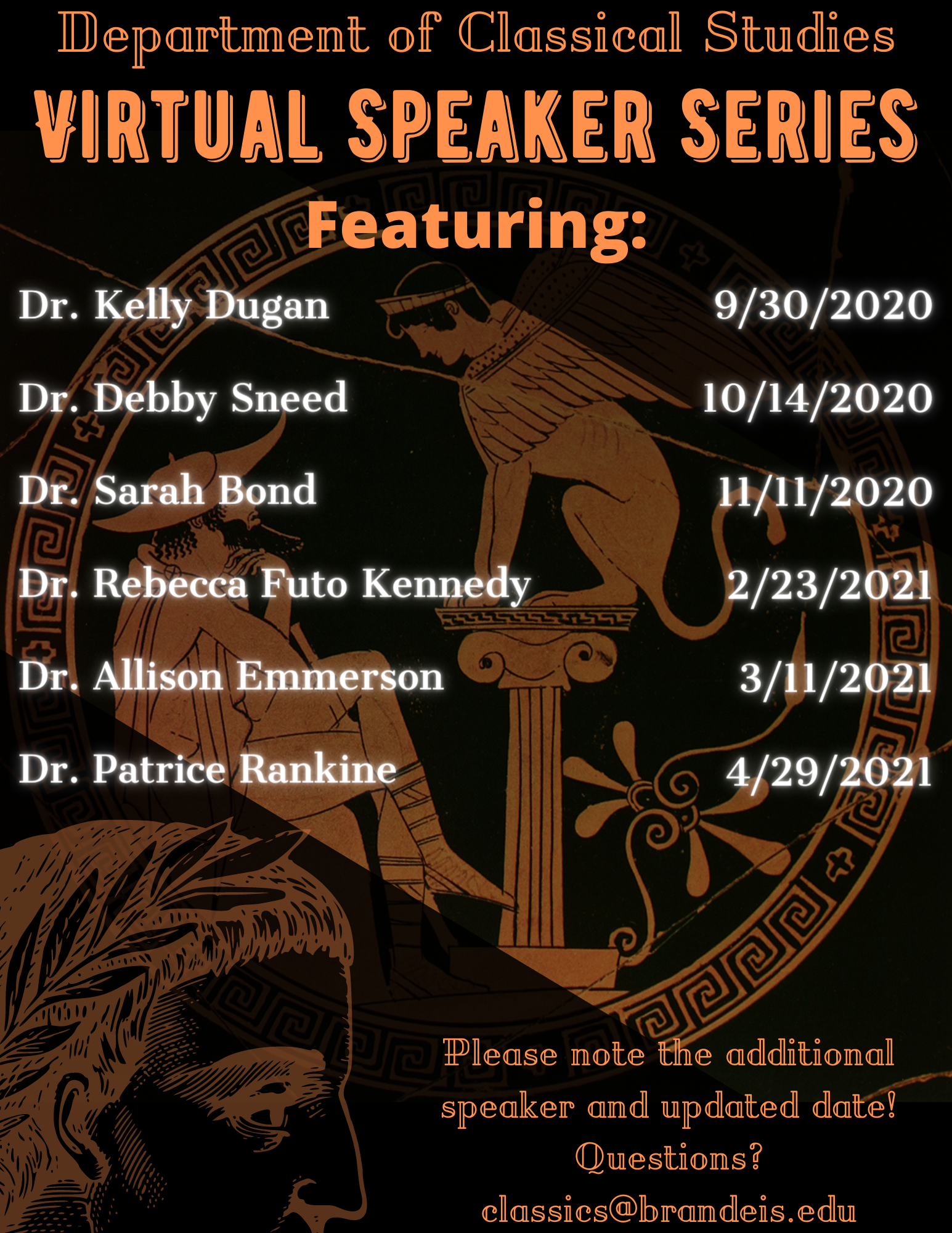Department Newsletter - Nuntius
Department of Classical and Early Mediterranean Studies 2020-2021
While 2020 and 2021 have been challenging in so very many ways, the Department of Classical and Early Mediterranean Studies and our community of scholars, colleagues, peers, and friends has seen through another successful academic year. Despite our physicial distance - as we all worked, studied, and researched remotely - we are proud of all the hard work, the dedication, and the passion that our students, faculty, and community showed in the face of such trying times.
3 graduates in the MA program from Fall 2020, Spring 2021!
Matthew Gabalski
Julia Greig
Claire Khokar
5 undergraduate majors!
Madeleine Cahn
Leah Kunins
Sarah Lorber
JAMR Marceau
Jack Vermette
6 undergraduate minors!
Shari Boiskin
Joshua Hoffman
Tessa Holleran
Zach Kern
Angela Mougiou
Casey Schryer
All of us in the Department of Classical and Early Mediterranean Studies wish you nothing but success wherever you go! We’d also like to highlight some of specific student achievements from this year!
Pursuing a PhD or another higher educational degree is a path of passion, dedication, and hard-work. Best of luck to all of our recently accepted students:
Julia Greig '21, PhD Philosophy, University of California, San Diego
Matthew Gabalski '21, School of Law, University of Buffalo
Additionally, this academic year has seen many of our students awarded a number of honors and prizes!
The Esther Goldman Prize for Excellence in Classical Art, Archaeology, and Ancient History to JAMR Marceau
GSAS 2021 Outstanding Graduate Teaching Award to Julia Greig
Exceptional Departmental Service, Hybrid Learning Transition of 2021 Award to Nicole Constantine
Departmental Award for Teaching Excellence to Julia Greig and Christopher Makauskas
Ancient Greek and Roman Studies Summer Fellowships to Kelly Ahrens, Rachael Cahoon, Nicole Constantine, Eduardo Fortes, Julia Grieg, Michelle Heeman, Christopher Makauskas, Sean Mao, and
Regina Nagan
Throughout this past year, we’ve been fortunate to host a robust virtual speaker series as well as provide professional development workshops, lectures and events:
"Henry 'Box' Brown and Classical Rhetoric: A Case Study on Racist Practices in 19th-century American Publishing" with Dr. Kelly Dugan
"Disability and Infanticide in Ancient Greece" with Dr. Debby Sneed
"From Fairs to International Archaeology Day: My Life in AIA Programs" with Dr. Ben Thomas
"Applying to PhDs and Graduate Programs, A Professional Development Workshop"
"Presenting Antiquity: Writing for the Public in an Age of Chaos" with Dr. Sarah Bond and Dr. Seph Rodney
"Classicists Considering Careers in Middle and High School Teaching" with Stephen Guerriero, MA '15
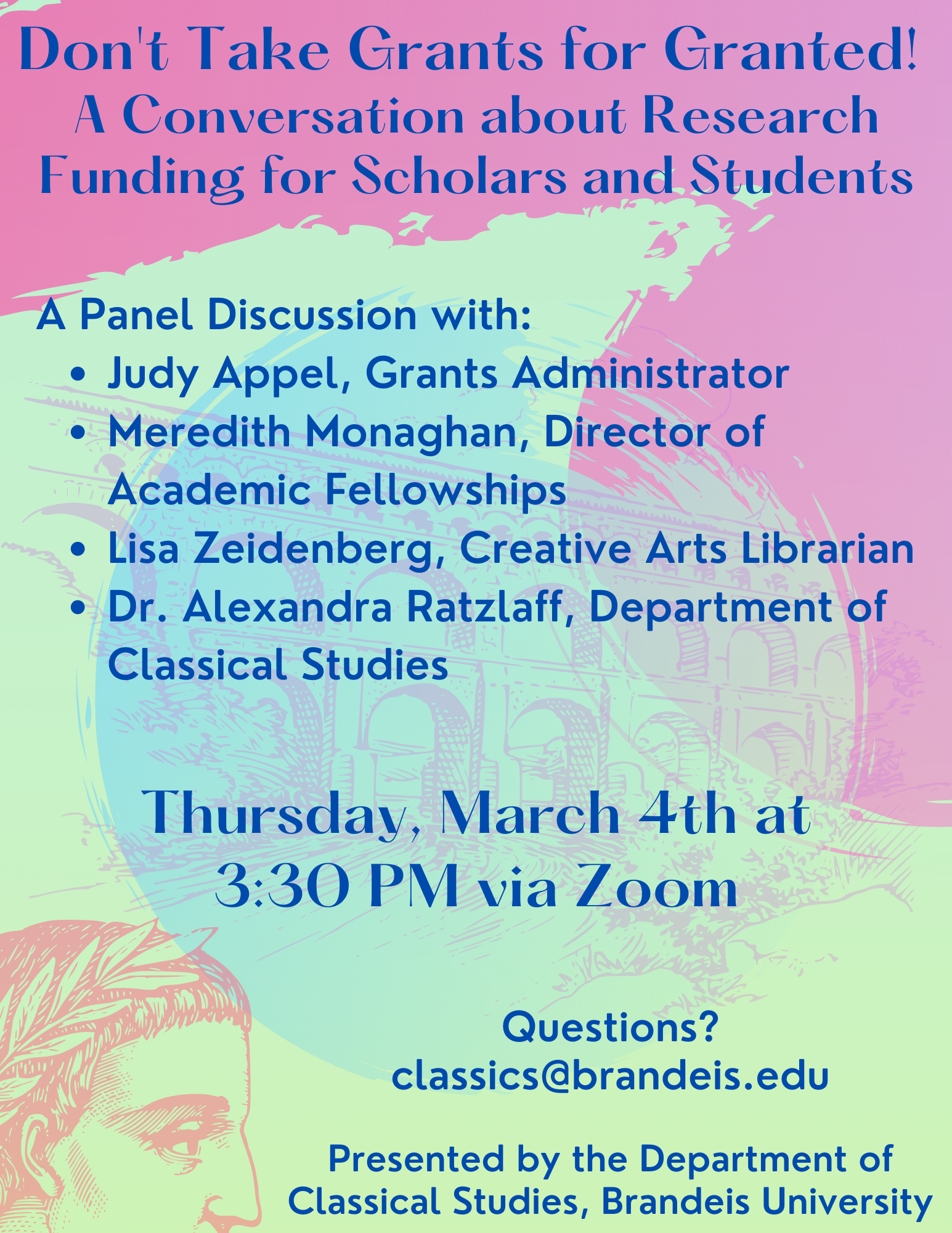
"Athenian Immigration and Race" with Dr. Rebecca Futo Kennedy
"Don't Take Grants for Granted! A Conversation about Research Funding for Scholars and Students"
"Another Man's Treasure? The Life and Afterlife of Pompeii's Waste" with Dr. Allison Emmerson
"Dignity, Abjection, and Hospitality: Some Epic and Dramatic Passages" with Dr. Patrice Rankine
Faculty Updates:
Note from Joel P. Christensen, Chair:
Dear Brandeis Classical and Early Mediterranean Studies Community,
I hope this message finds everyone healthy and looking forward to the rest of 2021 with hope. I am sure it will take us many years to understand how much our lives and worlds changed in 2020 and 2021, but we can take this time to stop and reflect on how far we have already come.
I cannot say enough about how dedicated and uplifting our faculty and staff have been this year. My colleagues shifted to online teaching modalities and committed day and night over last summer to bringing students a full range of courses designed for a remote learning environment. I know personally that online learning is hard on both sides of the screen, but what I heard and observed left me feeling inspired by how much our instructors and students learned over the past year.
David DeVore, our academic administrator, deserves special recognition for making sure we held social events from coffee hours to jeopardy, offering our first year of virtual talks - attended by audiences all over the world - helping to sponsor RaceB4Race: Politics - and basically being there every day to help students and faculty through their challenges.
Our students rose to the occasion as well. From the fine undergraduate theses by graduating seniors Madeleine Cahn and Jack Vermette to the MA theses defended by Julia Greig, Claire Khokhar, and Michelle Heeman, everyone worked hard to complete their degrees while still acknowledging the scale of the losses around us.
Faculty kept engaged with their work too. Our new faculty members Dr. Jillian Stinchcomb and Professor Brooks-Hedstrom taught their first classes without meeting any of us in person. Dr. Alex Ratzlaff continued her fantastic work with new technology, bringing her fantastic research to students in and outside the classroom while Dr. Matt Newman taught a one-of-a-kind myth course late at night on zoom. Professor Gillespie won a prestigious Loeb Foundation grant and Professor AOK-O helped to keep the University going, serving her second year as Head of the Division of Humanities. And there to keep us all honest was Professor Cheryl Walker, whose wit and wisdom showed through on zoom nearly as much as in ‘real life’.
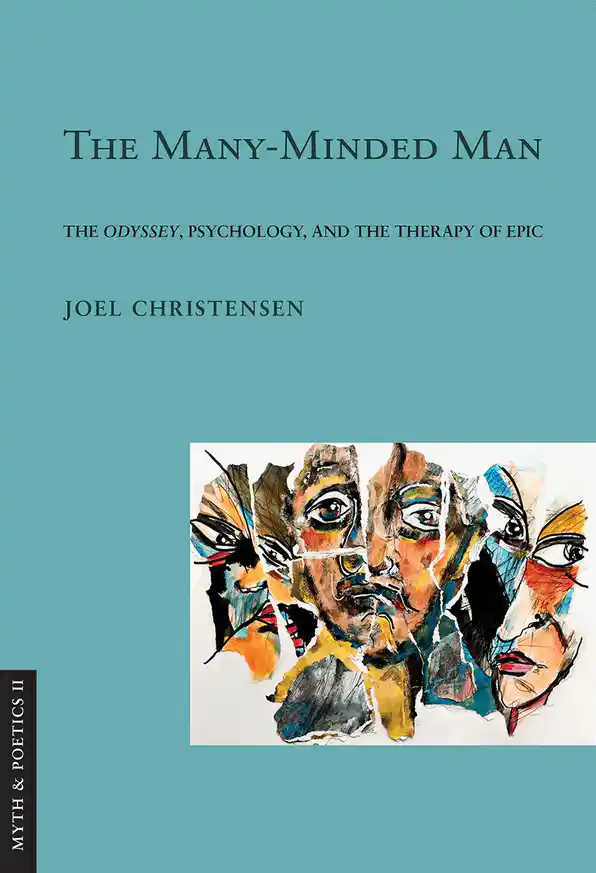
I spent the year busy with planning too, chairing the Brandeis Faculty Senate for a second term and hosting a year of episodes of Reading Greek Tragedy Online. 2020 saw the publication of my book on the Odyssey, The Many-Minded Man; but 2021 saw a new addition of a different kind: my spouse Shahnaaz (Brandeis, ‘01) and I welcomed our third child to the world in April.
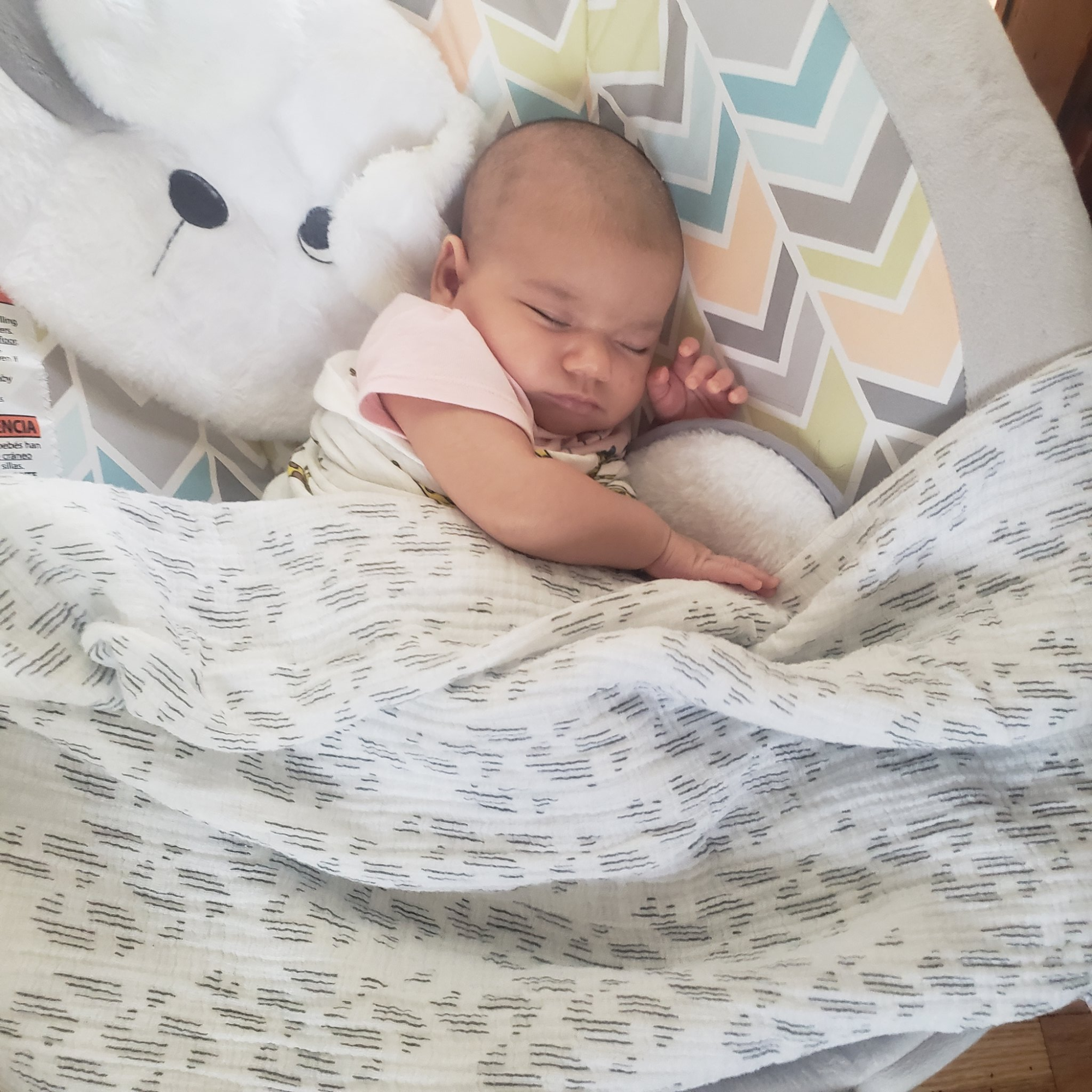
2021 and 2022 are going to bring us new challenges and changes. We will welcome Dr. Jeremy Swist as an instructor for the year and we will celebrate Dr. Alexandra Ratzlaff’s promotion to a multi-year contract. I will be stepping down as Chair of the Faculty Senate in July to become Senior Associate Dean of Faculty Affairs for the School of Arts & Sciences. Don’t worry, I’ll still be chair of Classical Studies and I have no plan to stop teaching any time soon!
I have been lucky and humbled to be part of this community for the past year. We have been able to rely on each other and have kept our goals in sight without compromising our values. I hope you all will join me in congratulating all our graduates for their success and cheering on everyone else as we move into a new academic year.
As always, if there is anything I can do for you, please don’t hesitate to reach out to me.
Yours,
Joel
Chair, Classical and Early Mediterranean Studies
Mandel Center for the Humanities, MS 092
Brandeis University, P.O. Box 9110
415 South Street
Waltham, MA 02453-9110 USA
FAX: 781-736-2184
joel@brandeis.edu
Website
sententiaeantiquae.com
@sentantiq
Note from Professor Ann Olga Koloski-Ostrow, Kevy and Hortense Kaiserman Endowed Chair in the Humanities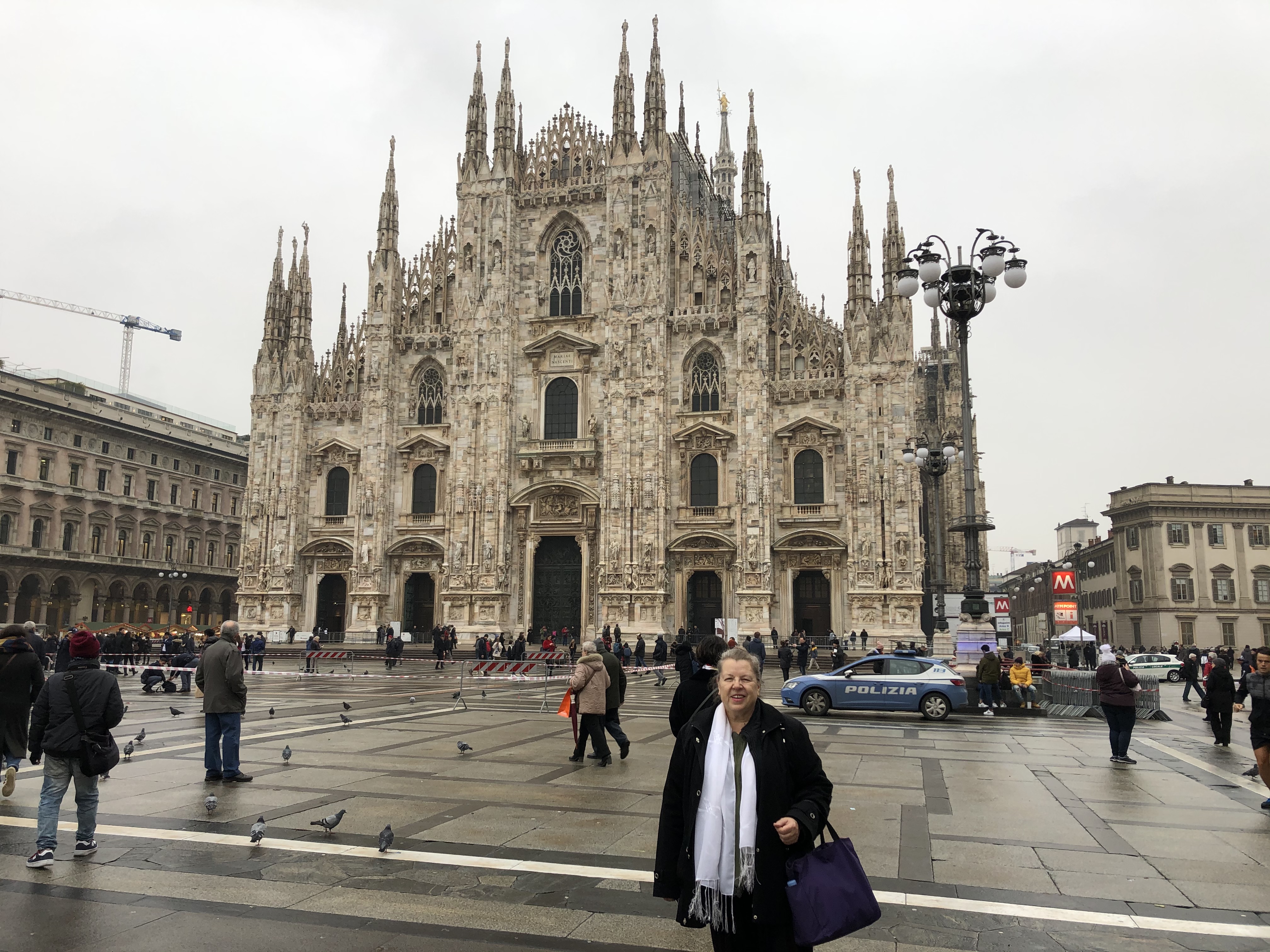
I’d have to say that 2020-21 has been perhaps the hardest academic year I’ve ever lived through—lots of lonely time; personal losses (to illness or death); struggles to keep on schedule when one is all alone; watching so much suffering among our students, staff, and faculty; trying to do well by Brandeis, the Department of Classical and Early Mediterranean Studies, and the Division of the Humanities, of which I have been the Head since summer 2019, after my year of sabbatical at the American Academy in Rome. The year is now almost over now, and I am so impressed with everything that we have all accomplished in 2020-21, despite the challenges of Covid-19, online learning, and many of our more normal practices shut down or significantly rearranged. Our seniors have defended truly excellent theses and papers. Everyone showed up to exams and finished final projects. Faculty met publication deadlines, finished evaluating student work, contributed extra time and energy to university service. We have far more to be proud of than to feel regrets about!
I am now in my final two years of academic life at Brandeis (retirement is set for June 30, 2022), so winding down my teaching (in 2020-21, I only taught about three class periods of our graduate Proseminar, for example), and I have focused in the past two years on work for the Division of the Humanities. I have decided, however, in part, because the stresses of the job as Division Head have constantly increased as the past year as gone by, that I shall step down as Division Head as of July 1st, 2021, and spend next year doing other kinds of university service (perhaps including helping the new Division Head) and working hard to finish my next three books:
- Making Sense of Pompeii and Herculaneum: Daily Life and the Sensorium of the Ancient Roman City (sole author). Under contract with Cambridge University Press, New York and Cambridge, England.
- Sixty-Eight Toilets and Urinals in the Ancient City of Rome: Sanitary, Urbanistic, and Social Agency, co-authored and edited with Gemma C. M. Jansen and Richard L. J. Neudecker. Under contract with BABESCH (Bulletin Antieke Beschaving) Leuven, Belgium.
- The Bloomsbury Cultural History of Technology, Volume I, Pre-History through Antiquity (2.5 MBP-600AD), contributor and co-editor with Rabun M. Taylor. Under contract with Bloomsbury Press, London, UK.
My goal is to have submitted the final proofs of all three of these books before my retirement date, June 30, 2022. Will be challenging, but I’ll definitely try. I am delighted that Dean Dorothy Hodgson has authorized a replacement hire for me, so I feel happy that Roman Art and Archaeology will continue to thrive in the Classical and Early Meiterranean Studies curriculum.
In other happy news, I was recently elected to serve on the Executive Committee of to the Advisory Council of the American Academy in Rome in fall 2020. In fall 2021, I shall run as a Society Trustee in a national election of the Archaeological Institute of America. In addition, I was appointed for the year 2022-23, the first year of my retirement, to be the Charles Eliot Norton Lecturer for the Archaeological Institute of American (giving six lectures all across the USA, Canada, and/or Alaska and Hawaii). Charles Eliot Norton, a Professor of the History of Art at Harvard University in 1897, founded, with a group of eleven associates, the Archaeological Institute of American and was elected its first President. During his presidency, which lasted for eleven years, Norton was involved in the supervision of Institute fieldwork in both Old and New Worlds, the founding of the American School of Classical Studies in Athens, and in the publication of the first American Journal of Archaeology.
I am truly honored to be included among the following distinguished Norton Lecturers:
2016/2017 Irving Finkel, Lothar von Falkenhausen
2017/2018 Mary Beard, Goran Nikšić
2018/2019 Andrea Berlin, Eric Cline
2019/2020 Maureen Carroll, John Cherry
2020/2021 Jeffrey Hurwit
I just held my last Humanities Council of the year (Wed., May 19) in my role as Division Head, and I am now looking forward to Brandeis Graduation on Sunday, May 23, at which I shall be the Master of Ceremonies for the Humanities Graduation. I see a summer of relaxing, reading, finishing my books, doing some articles, and working in my garden, and I look forward to all of that very much. My garden helps anchor me in time, space, and place—cheers me with stunning flowers, fresh-smelling veggies, herbs, and some new fruit trees I’ve just planted.
As I’ve said to you earlier, my garden keeps my archaeologist hands active! I certainly congratulate all of our graduates, thank you all for your care and kindness to me for all of the past year, and wish everyone a fantastic summer. I very much look forward to seeing many of you in person in the fall of 2021.
Warm regards,
Professor AOK-O
Ann Olga Koloski-Ostrow
Head of the Division of the Humanities (until July 1, 2021)
Kevy and Hortense Kaiserman Endowed Chair of the Humanities
Professor of Classical Studies, Affiliate Faculty of Anthropology, Fine Arts, Italian Studies, and Women, Gender, and Sexuality Studies.
Mandel Center for the Humanities, MS 092
Brandeis University, P.O. Box 9110
415 South Street, Waltham, MA 02453-9110 USA
phone: 781-736-2183
FAX: 781-736-2184
aoko@brandeis.edu
Note from Caitlin Gillespie
This year was of course nothing like we imagined, but our department has continued to thrive, and I have had the pleasure of teaching new classes, meeting new students, participating in conferences online, and seeing several articles in print. I continue to teach our one-year introductory Latin course, and introduced two new courses. In the fall, I co-taught a course on Race before Race: Premodern Critical Race Studies with Professor Dorothy Kim, and was pleased to be able to invite numerous guest speakers to our zoom classroom. In the spring, I created an advanced Latin course on Roman Historians, and was delighted and inspired by the creative projects that the students developed as part of their studies. I have been continually impressed by the achievements of our students during this difficult year, and was honored to advise the undergraduate thesis of Madeleine Cahn on isopsephy in Greco-Roman Egypt. As the Director of Graduate Studies, I connected with our graduate students on a regular basis, and look forward to seeing everyone face to face!
During the past academic year, several articles were published as well. “Messalina's Moveable Domus: Landscape and Memory in Annals 11,” was published in the New England Classical Journal; “Agrippina the Elder and the Memory of Augustus in Tacitus’ Annals,” appeared in Classical World; and “Daring to Die: Female Suicide in the Age of Nero,” was published in the Quaderno di Polygraphia. In the spring, I participated in an online conference hosted by the Institute for Classical Studies in London and gave a talk entitled, “Superstitio as Imperial Resistance: The Case of Pomponia Graecina.” The themes addressed in these articles and this and other talks are building towards a manuscript for my next book project on memory and women’s movements, as recorded in Tacitus’ Annals.
In the fall, I was honored to be named the Helaine and Alvin Allen Chair of Literature, and I hope to uphold the expectations of this position. In the spring, I was awarded a fellowship from the Loeb Classical Library Foundation, as well as a Norman Junior Faculty Research Leave. These honors allow me to take a sabbatical for the next academic year, over which I hope to complete the manuscript for my next book, as well as see additional publications and at least three book reviews see the light of day. I will miss our students, and look forward to returning to teach in the fall of 2022! Until then, take care, and don't hesitate to get in touch!
Note from Alexandra Ratzlaff
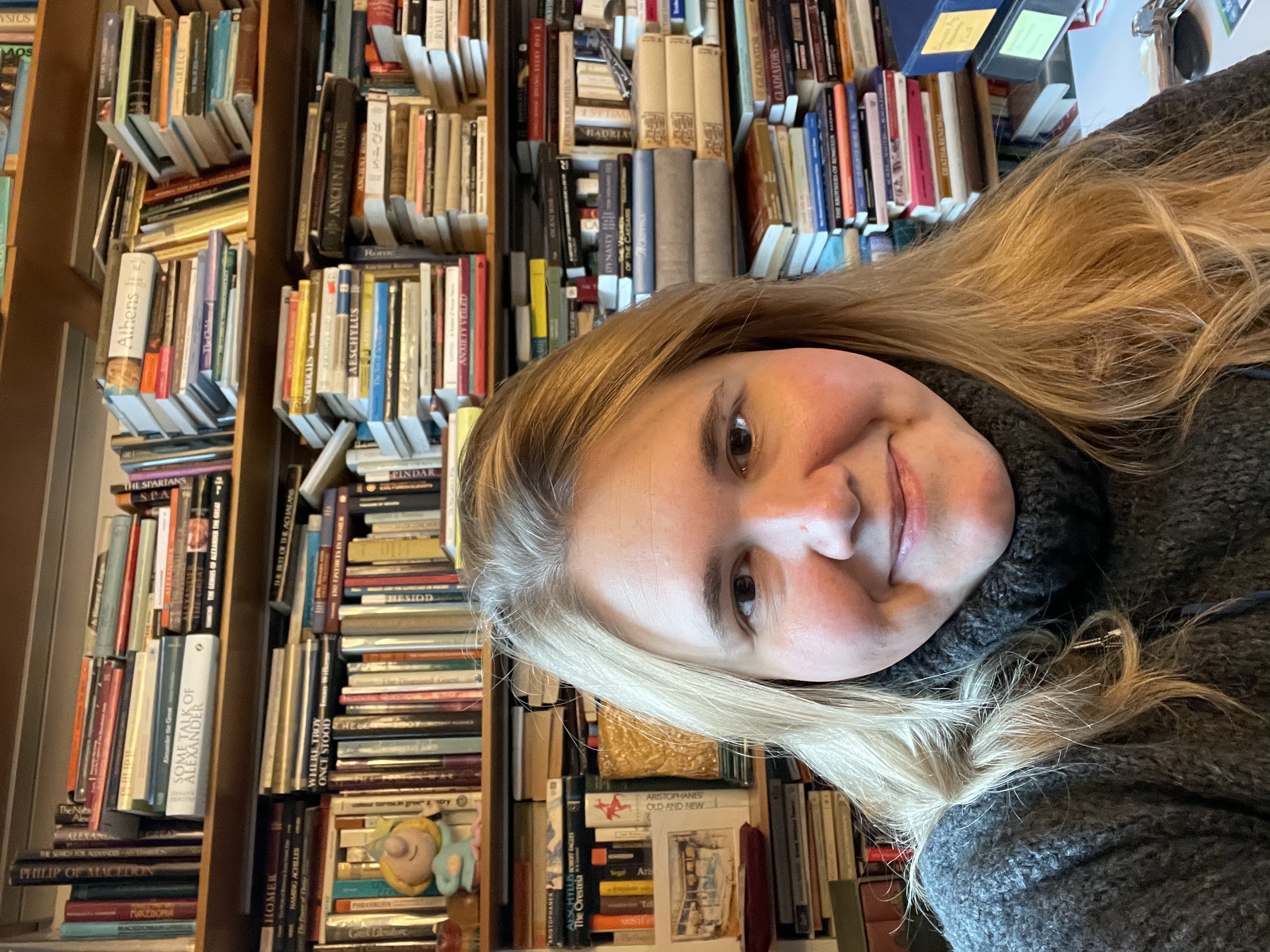 The fall brought new challenges beginning the year teaching completely online, but it was also a chance to try new approaches to presenting material and interacting with students. In the Art and Archaeology of Ancient Greece they created postcards from the Ancient Greek World and enjoyed group projects in which they developed their own Greek colonies. In my new course, Greek and Roman Mystery Cults, we had interesting and engaging conversations about the development and transmission of ancient cults, and even created their own mystery cult detailing the material culture associated with it. This spring, I included new projects in my courses including an ArcGIS Storymapping Project in the Art and Archaeology of the Hellenistic World and building Virmuze exhibits in The Archaeology of the Bronze Age Mediterranean: Greece, Egypt, and the Levant. I was thoroughly impressed with the student projects that were creative and innovative reflections of the material covered in class. In the Archaeological Ethics, Law, and Cultural Heritage we had a great semester addressing a variety of current issues and engaging in lively class debates. I am also very excited to be stepping in next year as the Director of Graduate Studies while Professor Gillespie is away on her Loeb Fellowship. I’m looking forward to the chance to work with the current and new class of students.
The fall brought new challenges beginning the year teaching completely online, but it was also a chance to try new approaches to presenting material and interacting with students. In the Art and Archaeology of Ancient Greece they created postcards from the Ancient Greek World and enjoyed group projects in which they developed their own Greek colonies. In my new course, Greek and Roman Mystery Cults, we had interesting and engaging conversations about the development and transmission of ancient cults, and even created their own mystery cult detailing the material culture associated with it. This spring, I included new projects in my courses including an ArcGIS Storymapping Project in the Art and Archaeology of the Hellenistic World and building Virmuze exhibits in The Archaeology of the Bronze Age Mediterranean: Greece, Egypt, and the Levant. I was thoroughly impressed with the student projects that were creative and innovative reflections of the material covered in class. In the Archaeological Ethics, Law, and Cultural Heritage we had a great semester addressing a variety of current issues and engaging in lively class debates. I am also very excited to be stepping in next year as the Director of Graduate Studies while Professor Gillespie is away on her Loeb Fellowship. I’m looking forward to the chance to work with the current and new class of students.
Despite being limited to virtual opportunities I was able to participate in a number of events, including chairing the ASOR Byzantine Archaeology Session, lecturing for the Stanford University Archaeology Center, and the Friends of ASOR International Webinar Series. At Brandeis, I enjoyed sharing my research with CLARC and Techne Group as part of the Close Talking Series, the Social Science Series, the Boston Children’s Museum, and others. During the past year I had a number of projects published including four chapters in our new volume on the Tel Kabri Excavations, a chapter called “The Art and Architecture of the Caesarea Mithraeum, Reconstructing Evidence for Cult Ritual” In Archaeology of Mithraism: Conference Approaches, and an article “Tel ‘Afar (Tell el-Akhdar): A Monastery and Pilgrim Station on the Via Maris South of Caesarea” published in Palestine Exploration Quarterly, among others. This summer I will be working as co-editor on the next Tel Kabri III volume and writing three chapters for it, as well as a chapter on the Hellenistic and Roman plain wares in the Akko Harbor Excavation book, and an article on the Roman Cemetery at Dor (Israel). I am also planning a new excavation project as co-director, beginning next summer at the Late Roman Fort at Birsama (Israel). This will be a field school for students and an opportunity to test new equipment and digital field methodologies developed by the Brandeis Techne Group. As Project Leader of the Techne Group I enjoyed our continued work on new imaging technologies and the creation of several new projects for next year, including getting back to our residency at Autodesk. We also received a grant from Autodesk to help continue to support our work with them.
With the spring and relaxing of COVID restrictions I enjoyed hiking on our days of nice weather. I hope to get in some longer hikes this summer and see a bit more of New England during this time of year when I am usually away on excavation.
Update from CLARC:
Our interns and volunteers at CLARC had a productive year working on a variety of projects. Undergraduate interns developed individual projects ranging from Luristan bronzes to Late Roman coins and exploring the senses through artifacts as well as the historical archive of CLARC. Students curated exhibits now on display in the library. This year we began a Virtual Reality CLARC museum to exhibit digital 3D models of artifacts. The same displays the students created for the library will be featured similarly in VR CLARC. This is part of an ongoing collaboration with the Brandeis Techne Group, in which together we are learning best practices for digital imaging and modeling artifacts to curate them in a digital environment, as well as using them in classes and to share with the public. We hope to have Virtual CLARC available for online access by the end of the fall semester (2021). Over the summer undergraduate and graduate students are working on new CLARC curation projects as well as participating in introductory ceramics and digital imaging workshops. Through a publication partnership with the Joint Expedition to Caesarea Maritima and Drew University, Dr. Ratzlaff was given access to a large assemblage of Hellenistic, Roman, and Byzantine pottery from the ancient city of Caesarea on Israel’s Mediterranean coast. Students are learning everything from the basics of pottery analysis to how to photograph and 3D model sherds, then in the fall a new class (CLAS 113a) will focus on the hands-on full process of analysis to publication and curation.
Note from Darlene Brooks Hedstrom
This is my first year at Brandeis and I could not be happier in joining the faculty in the departments of Classical and Early Mediterranean Studies and Near Eastern and Judaic Studies. After a nearly two-decade career in the History Department at Wittenberg University, I was delighted to become the next Myra and Robert Kraft and Jacob Hiatt Associate Professor of Christian Studies and be a joint appointment. What this means is that I can participate fully in supporting the study of premodern history and in particular, demonstrate the connections that exist between the Classical world and the post-Classical world in the eastern Mediterranean. I am an archaeologist of Late Antiquity and in particular Christian settlements that are monasteries. I have a fondness for mud brick architecture and theoretical archaeology. Right now, I am writing up the excavation results for the Yale Monastic Archaeology Project for the excavation of a monastic residence at the monastic community of John the Little in Wadi Natrun, Egypt.
My desire to join the Brandeis community stemmed in large part from my training in graduate school with Prof. Edwin Yamauchi, who graduated from Brandeis in 1963 with a PhD in Mediterranean Studies. I studied with Yamauchi at Miami University (Ohio) in a history program and was trained to teach courses from the Ancient Near East to Late Antiquity. He talked often of his professor, the famous Prof. Cyrus Gordon, and why we needed a grounding in the widest extent of the ancient past. Yamauchi was also passionate about the details of each civilization. His commitment to the comparative benefits of deep history shaped my approach toward archaeology and history. While colleagues at other schools dived deep into one civilization or time period, Yamauchi brought Brandeis’ Mediterranean world view to his doctoral students. Due to Ed’s teachings, I developed a wide array of interests in the past from the wall paintings of dolphins in Etruscans tombs, to the Lukkan pirates in the Bronze age, to Christianity under the first caliphates, to the Gospel of Mary’s gender ascension passages, and the value of a monk’s cell to train the mind. In many ways the Brandeis training I received allowed me to be comfortable with the margins and boundaries of ancient fields.
The Kraft-Hiatt Chair in Christian Studies is a position in which I am proud to be situated in both Classical Studies and in Near Eastern and Judaic Studies. I am also a member of the Religious Studies program where I can contribute to the study of religious practices, traditions, and materiality. At Brandeis I will be able to return to my roots and help train a new generation of students with new idea and theories about how to study the past. I am looking forward to teaching courses such as Denial and Desires: Gender and Sexuality in the Early Church and the Medieval Roman empire (aka Byzantine History). I taught my Mummies, Myths, and Monuments of Ancient Egypt (MMM . . . Egypt) course this spring to be followed by the Dangerous Beauty: Cleopatra and Gender Politics course for Spring 2022.
I am really looking forward to being in person in the fall when I can meet with students on campus and get a real sense of what it means to be at Brandeis. Here’s to seeing everyone in the fall!
Note from Jillian Stinchcomb
This was a weird year to be introduced to Brandeis: I still haven't met many folks in person yet, and I've only been in my office a handful of times. The difficulties of teaching and learning online and trying to manage everything in the midst of the pandemic has made it clear, though, that I'm very lucky to be a part of this community. Everyone in the department has been welcoming and friendly and the students in Queens of the Ancient Mediterranean World and Hebrew Bible/Old Testament were incredible. Thank you all for making this weird year more fun and interesting: it would have been so much harder without you. In the latter half of 2020, I moved to Waltham, defended my dissertation, started teaching at Brandeis, and presented a paper at the Tauber Center for European Jewry in November. In winter/spring 2021, I wrote two book reviews, finalized a chapter of a forthcoming edited volume, and submitted an article on gender identity and the Queen of Sheba to Hebrew Studies with the help of a new (and beloved) writing group. This summer, I'll be working on my book proposal, finalizing two other articles, and using camping trips as an excuse to explore New England. I'm looking forward to meeting everyone in person soon!
Note from David DeVore, Academic Administrator
My inclination for these types of notes would be to say “another year down,” but considering the year we all just struggled through, it seems rather disingenuous. This past academic year has been incredibly difficult, especially for our students and faculty. Personally, I found a tremendous amount of hope as well as a renewed sense of drive and purpose from their continued passion, curiosity, and joviality in the most isolated and trying parts of the pandemic. As I mentioned last year, I find myself at a loss as to how to best express my gratitude for being a member of our community of scholars, peers, colleagues, and friends.
Despite the pandemic, the distance, and the digital environs of the past year, the department continued much as it always has! We converted our usual speaker series into a rather successful virtual format. We also continued to broaden our professional development series. We were elated to host so many notable guest lecturers and speakers throughout the year, including: Dr. Kelly Dugan, Dr. Debby Sneed, Dr. Ben Thomas, Dr. Sarah Bond and Dr. Seph Rodney, Stephen Guerriero (MA '15), Dr. Rebecca Futo Kennedy, Dr. Allison Emmerson, and Dr. Patrice Rankine. Additionally, we continued to find ways to be social and to bring our department together through coffee hours, movie nights, and game nights. Many of which we are eager to continue in the coming year.
The return to campus this Fall is full of promise and exciting opportunities for both our students and faculty. I am very excited to welcome to campus our returning graduate students (some of whom we've only ever met virtually) as well as the new incoming cohort of Master’s candidates. Additionally, I am eager to see the familiar faces of our wonderful undergraduates! All in all, I am greatly looking forward to the new academic year.
